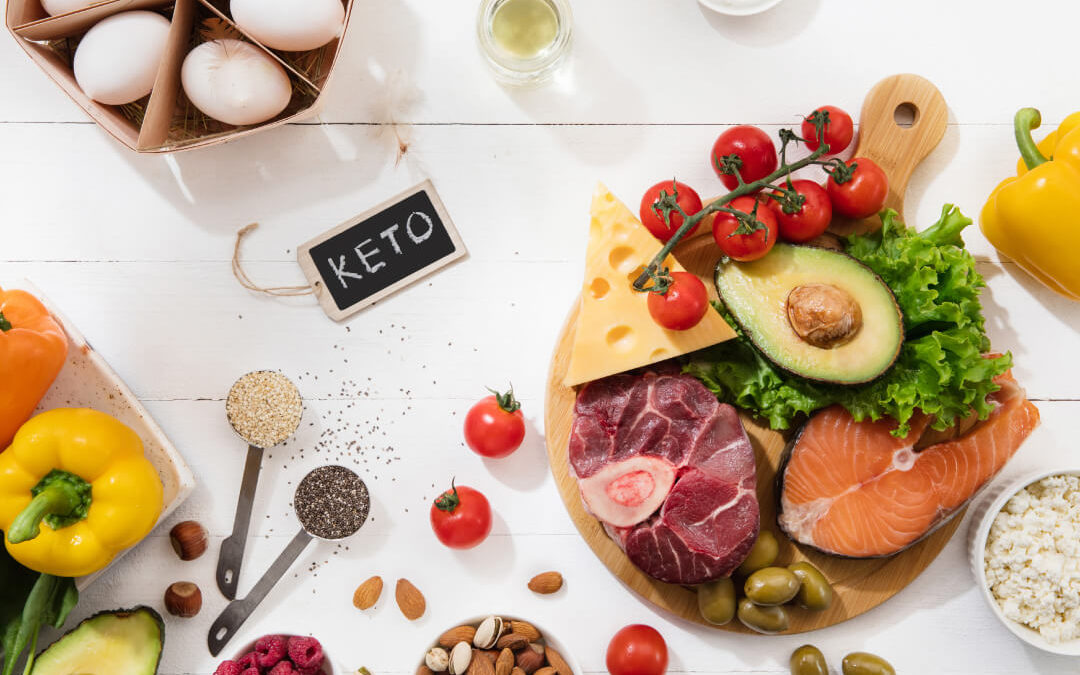The ketogenic diet is a high-fat, adequate-protein, and low-carbohydrate diet that forces the body to burn fats rather than carbohydrates.
Normally, the carbs in food are converted into glucose, which is transported around the body and is particularly used as energy for muscles and many organs, including the brain.
In a keto diet, fat is used instead of carbohydrate to fuel up your body and its functions.
Sounds good? Well, then you can begin your keto diet by reading our article:
Need more help? Read ahead to find out our 5 top tips to start your keto lifestyle like a pro.
1. Limit Your Carb Intake
On a keto diet, it’s necessary to keep your carb intake low. This means you must avoid bread, pasta, rice, and sugary foods like candy and soda.
One of the main principles of the keto diet is to limit your carb intake to the lowest level, typically less than 50 grams per day.
By dramatically reducing carbs, your body is forced to turn to stored fat for energy, which can lead to weight loss.
Lowering carbohydrates in your diet is essential for a keto life, but you mainly need a protein-rich diet.
2. Get Enough Protein
While a keto diet focuses on fat, getting enough protein is still significant. Good protein sources on a keto diet include meat, poultry, fish, and eggs.
And now, you’re thinking about ways of keeping a keto diet in the Caribbean! This enchanted region provides enough sources of fish and shellfish protein to include in your diet. Plus, you can enjoy the beaches and landscapes without noticing you’re on a diet.
You must be wondering how to keep this dietary regime on these islands with so many food temptations around. No worries! The answers to your questions are in our article:
- Keto Questions: Is a ketogenic diet possible if you live in the Caribbean? How to know if a ketogenic diet is right for you?
Every meal is important! You need to ensure that you get enough protein throughout the day and include a protein source in every meal and snack. This will help you meet your protein needs and keep your body fueled.
3. Keep Track of Your Macronutrient Intake
The ketogenic diet is a high-fat, moderate-protein, low-carbohydrate diet. That’s why it’s important to track your intake of these macronutrients to ensure you’re getting the proper amounts.
It’s crucial to know how much fat, protein, and carbohydrates you should consume on a ketogenic diet. A typical breakdown for a ketogenic diet is 70-80% fat, 20-25% protein, and 5-10% carbohydrates.
This isn’t all! You need to know you’re focusing on eating healthy high-fat and low-carb foods. These include avocados, nuts and seeds, olive oil, and coconut oil. Read more about keto high-fat foods and other tips in our article:
Nutrients are an essential part of any diet! That’s why planning your meals guarantees you aren’t missing them.
4. Plan Your Meals
Meal planning can help you stay on track with your ketogenic diet and make it easier to stick to your goals. Try to plan your meals for the week in advance, and consider making extra servings so you have leftovers for lunch or dinner.
Here is the interesting part! On a ketogenic diet, your body enters a state of ketosis, in which it begins to use fat as its primary fuel source instead of carbohydrates. This can lead to weight loss and other health benefits, such as increased energy and improved blood sugar control.
How to stick to a keto diet? You should plan weekly menus to keep you organized and motivated to lose weight. Daily menus can include a balanced breakfast, eggs cooked in coconut oil, spinach, and avocado. And for lunch, you can have grilled chicken with roasted vegetables.
Don’t forget the last meal of the day! Salmon with broccoli and cauliflower are good keto options for any dinner.
Luckily, there’s a myriad menus you can create for your keto diet and you can find out some keto-friendly recipes in our article:
Wait! Don’t forget a snack! Nature’s Discount offers the most delicious keto snacks and you don’t need to get anxious between meals. Read more about our keto-friendly snacks in our article:
5. Add Keto-friendly Supplements
The ketogenic diet can indeed provide the nutrients your body needs, but some people prefer to take supplements.
What’s the best dietary supplement? Even though they cannot substitute a healthy diet, there’re products that can boost your weight loss. Most of them can reduce anxiety and carb cravings to help you keep a healthy metabolism.
There are many other keto supplements that can even prevent nutrient deficiencies and ease side effects such as headaches and nausea.
Want to know more? Read our article to get some recommendations to support a keto diet and the supplements you need:
It can take a few weeks for your body to enter a state of ketosis, burning fat for energy instead of carbs. It’s important to be patient and stick with the diet, even if you don’t see immediate results.
Follow our recommendations and keep an eye on our products to ensure that you’re getting all nutrients your body needs for a keto life at Nature’s Discount *.
*Products may vary per island.



